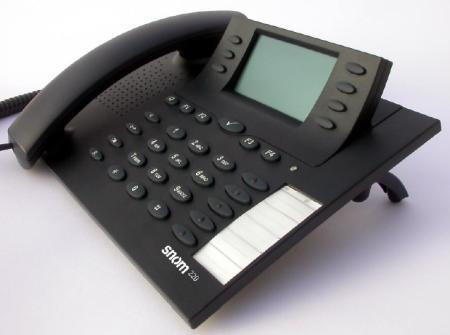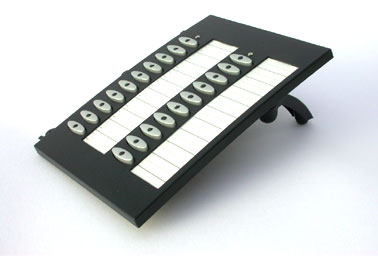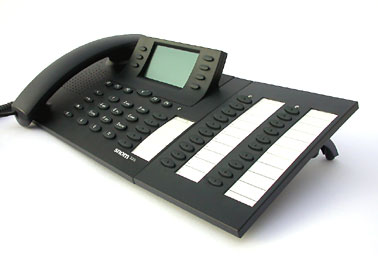Device Profile: Snom 220 enterprise VoIP phone
Aug 10, 2004 — by LinuxDevices Staff — from the LinuxDevices Archive — 14 viewsSnom has released a Linux-based VoIP phone for small- and medium-sized enterprises. The “high-end affordable” Snom 220 offers international language support, including Asian languages, and many advanced features such as 16-bit audio, call waiting indication, call intrusion, call divert, call park, call pick-up, music-on-hold, and more.

The 220 is the top of Snom's line of Linux-based VoIP phones
(Click to enlarge)
 The 220 is based on an embedded PowerPC processor. It boots a 2.4.18 Linux kernel from 4MB of Flash, and includes 16MB of system RAM.
The 220 is based on an embedded PowerPC processor. It boots a 2.4.18 Linux kernel from 4MB of Flash, and includes 16MB of system RAM.
The phone features a 128 x 64 pixel backlit LCD screen that supports a variety of languages through NLS (national language support) and ALS (Asian language support). Up to three programmable key extension modules (pictured at right) can be added for a total of up to 60 programmable keys. The phone can be used hands-free with a headset.
Snom says the phone is easy and intuitive to use. Its interface includes four “soft keys” that change functions dynamically according to context, to “guide the user through call features and functions.” It includes a built-in web server, and supports centralized update and management capabilities.
Snom says the device is guaranteed against wiretapping, thanks to TLS (transport layer security) encryption. Additional features include:
- 5 programmable function keys
- RFC 3261-compliant SIP stack
- H.323/H.450 stack
- NAT support
- 16-bit, 16 kHz audio subsystem
- 2 port Ethernet switch
- loose routing and strict routing support
- blind and attended transfer
- call hold, call wait
- music on hold support
- call completion
- call intrusion
- call divert
- number guessing
- speed dialing
- missed calls, taken calls
- call waiting indication
- STUN client (NAT traversal)
- Plug and Play support (UPnP)
- HTTP Server
- phone book
- conference call
- redial
- several ring tones
- DTMF

Snom launched its first Linux-based VoIP phone in May of 2002, and currently offers several models. It also sells SIP (session initiation protocol) soft switches and VoIP phone accessories.
This article was originally published on LinuxDevices.com and has been donated to the open source community by QuinStreet Inc. Please visit LinuxToday.com for up-to-date news and articles about Linux and open source.